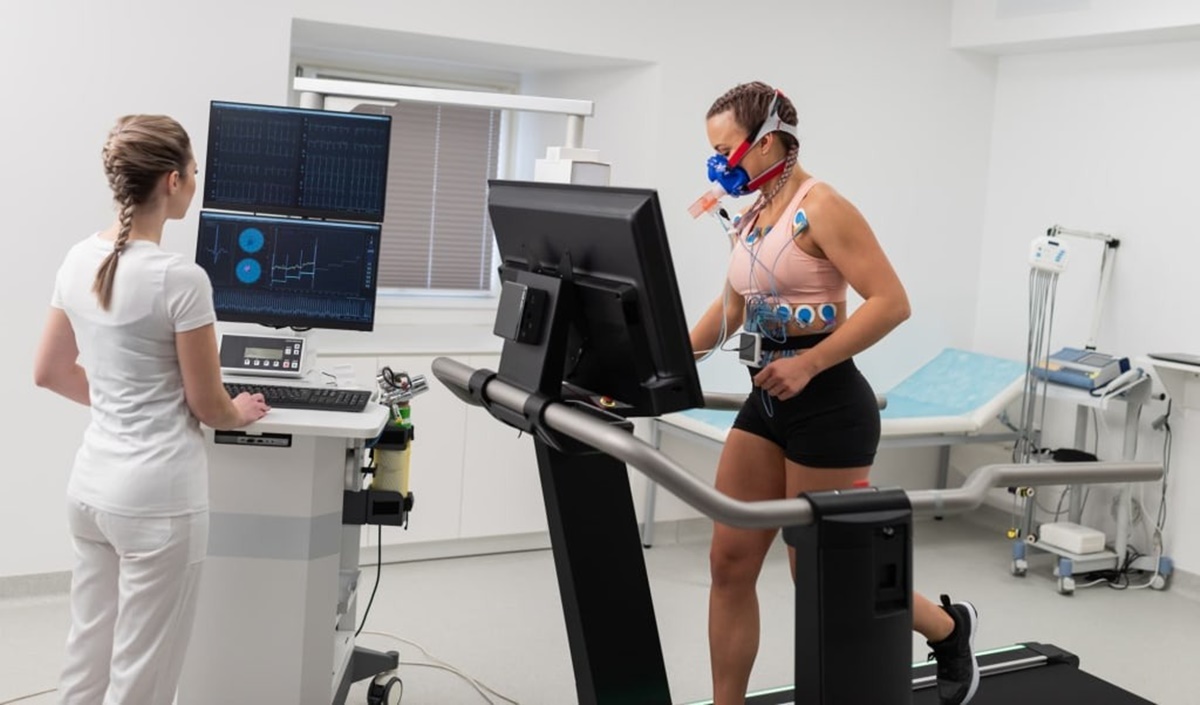

Featured
What Is An Exercise Science Degree
Modified: January 22, 2024
Discover the benefits and career opportunities of an Exercise Science Degree. Learn more about this featured program and jumpstart your future in the fitness industry.
Introduction
Exercise Science is a field that combines the study of human movement, physiology, and nutrition to improve athletic performance, prevent and manage chronic diseases, and enhance overall health and well-being. It is a multidisciplinary field that integrates principles from biology, chemistry, anatomy, psychology, and biomechanics.
Exercise Science degrees are becoming increasingly popular as people recognize the importance of physical activity and its impact on health. Whether it’s training elite athletes, managing chronic diseases, or promoting healthy living, professionals in this field play a vital role in improving the quality of life for individuals and communities.
An Exercise Science degree provides students with the knowledge and skills necessary to assess, plan, and implement exercise and wellness programs. Graduates of this program can pursue careers in various settings, including fitness centers, rehabilitation facilities, corporate wellness programs, sports performance facilities, and more.
This article will provide an overview of Exercise Science degrees, discuss their importance, explore career opportunities in the field, delve into the coursework and skills developed in a degree program, highlight potential salary and job outlooks for Exercise Science graduates, and showcase popular universities and programs offering Exercise Science degrees.
If you have a passion for physical activity, health, and helping others, a degree in Exercise Science may be the perfect fit for you. Let’s dive deeper into the world of Exercise Science and discover the exciting opportunities this field has to offer.
Overview of Exercise Science
Exercise Science, also known as kinesiology or exercise physiology, is a discipline that focuses on the study of human movement, physical fitness, and the effects of exercise on the human body. It encompasses a wide range of topics, including anatomy, physiology, biomechanics, nutrition, and psychology. By understanding how the body functions and responds to exercise, Exercise Science professionals can develop effective exercise programs, promote optimal health, and enhance athletic performance.
The field of Exercise Science is rooted in scientific research and evidence-based practice. It involves studying the physiological, biomechanical, and psychological aspects of exercise and physical activity. Researchers and practitioners in this field explore topics such as exercise metabolism, cardiovascular and respiratory responses to exercise, strength and conditioning, motor control and learning, and the impact of exercise on chronic diseases.
Exercise Science professionals work with individuals of all ages and fitness levels, from professional athletes to sedentary individuals seeking to improve their health. They assess clients’ fitness levels, design personalized exercise programs, and monitor progress to ensure safety and effectiveness. Additionally, Exercise Science professionals may work in clinical settings, providing exercise interventions for individuals with chronic conditions such as diabetes, obesity, cardiovascular disease, and cancer.
In recent years, the importance of exercise for overall health and well-being has gained significant recognition. The field of Exercise Science has expanded rapidly, leading to increased demand for professionals in various industries. Whether it’s working in sports performance, corporate wellness, rehabilitation, or public health, Exercise Science graduates have diverse career opportunities.
Through their knowledge and expertise, Exercise Science professionals can contribute to the promotion of a healthier and more active society. By understanding the physiological and psychological benefits of exercise, they can effectively educate and motivate individuals to adopt and maintain active lifestyles.
Now that we have learned about the overview of Exercise Science, let’s explore the significance of obtaining an Exercise Science degree and delve into the various career opportunities available in this dynamic field.
Importance of Exercise Science Degrees
Exercise Science degrees are becoming increasingly important in today’s society as the importance of physical activity and its impact on health is widely recognized. These degrees provide individuals with the knowledge and skills needed to effectively assess, prescribe, and implement exercise programs for a variety of populations.
One of the key reasons why Exercise Science degrees are important is the rising prevalence of chronic diseases such as obesity, diabetes, and heart disease. These conditions are largely preventable and manageable through lifestyle interventions, including regular physical activity. Graduates with an Exercise Science degree are equipped to work in clinical settings, developing exercise programs that can help individuals minimize the risk factors associated with these diseases and improve their overall health.
Furthermore, as the obesity epidemic continues to grow, there is a growing need for professionals who understand the science behind weight management and can help individuals achieve and maintain a healthy weight. Exercise Science degree holders can work in fitness centers, weight loss clinics, and other related industries, assisting clients in reaching their weight loss goals through a combination of exercise and nutrition.
Apart from chronic disease management, Exercise Science degrees are also essential for enhancing athletic performance. Whether it’s training professional athletes or working with recreational athletes seeking to improve their abilities, exercise science professionals possess the knowledge to design effective training programs that maximize performance while minimizing the risk of injury.
Exercise Science degrees are also valuable in corporate wellness programs. Many organizations are recognizing the importance of promoting employee health and well-being to improve productivity and reduce healthcare costs. Exercise Science professionals can work in corporate settings, developing wellness initiatives, conducting health assessments, and leading group fitness classes to encourage employees to adopt healthier lifestyles.
Lastly, Exercise Science degrees provide a solid foundation for further education and specialization in related fields. Graduates can pursue advanced degrees in areas such as physical therapy, sports medicine, exercise physiology, or nutrition, opening the door to even more career opportunities.
In summary, Exercise Science degrees are important as they equip individuals with the knowledge, skills, and scientific understanding needed to make a positive impact on people’s lives. Whether it is promoting overall health and well-being, managing chronic diseases, enhancing athletic performance, or contributing to corporate wellness programs, Exercise Science professionals play a crucial role in improving the health of individuals and communities.
Career Opportunities in Exercise Science
A degree in Exercise Science opens up a wide range of career opportunities in various settings. Graduates of Exercise Science programs can pursue careers in fitness and wellness, sports performance, clinical settings, and research and education.
In the fitness and wellness industry, Exercise Science professionals can work as personal trainers, fitness instructors, or wellness coaches. They design and implement exercise programs tailored to clients’ individual goals, conduct fitness assessments, and provide guidance on nutrition and lifestyle habits. Employment can be found in fitness centers, gyms, and private training studios.
Sports performance is another area where Exercise Science graduates can thrive. They can work with athletes of all levels, from recreational to professional, and design training programs to improve performance, prevent injuries, and enhance overall athletic abilities. Opportunities exist in sports performance facilities, collegiate and professional sports teams, and institutes specializing in sports training.
Exercise Science professionals also have a role in clinical settings, working alongside healthcare teams to implement exercise interventions for individuals with chronic conditions or recovering from injuries. They collaborate with physical therapists, physicians, and other healthcare professionals to create personalized exercise programs that aid in rehabilitation, improve cardiovascular health, manage diabetes, and more. Jobs in this area can be found in hospitals, rehabilitation centers, and medical clinics.
Addtionally, Exercise Science graduates can pursue careers in research and academia. They can work as research assistants, exercise physiologists, or educators, conducting studies to advance the understanding of exercise science and its applications. These professionals can be employed in universities, research institutions, or government agencies.
Moreover, with the growing interest in corporate wellness programs, Exercise Science professionals can play a vital role in promoting employee health and well-being in the workplace. They can work as wellness coordinators, designing and implementing wellness initiatives, conducting health screenings, leading group fitness classes, and providing education on healthy lifestyle habits.
Overall, the career opportunities in Exercise Science are diverse and rewarding. Professional growth and specialization are also possible through additional certifications and advanced degrees in areas such as sports nutrition, strength and conditioning, or exercise physiology. With the increasing emphasis on health and well-being, the demand for Exercise Science professionals is expected to continue to grow.
Coursework in an Exercise Science Degree
An Exercise Science degree program typically consists of a comprehensive curriculum that covers various areas related to human movement, physiology, nutrition, and exercise prescription. The coursework varies among institutions, but here are some common courses you can expect to encounter:
- Anatomy and Physiology: This course provides a thorough understanding of the structure and function of the human body, including the musculoskeletal, cardiovascular, and respiratory systems. Students learn about the major bones, muscles, organs, and how they interact during movement and exercise.
- Exercise Physiology: This course explores the physiological responses and adaptations that occur during exercise. It covers topics such as energy systems, cardiovascular function, respiratory responses, and the effects of training on the body. Students gain an in-depth understanding of how the body responds and adapts to exercise.
- Kinesiology: Kinesiology is the study of human movement. This course delves into the mechanics of movement, including the analysis of joint structures, muscle actions, and biomechanical principles. Students learn how to assess and improve movement patterns to enhance performance and reduce the risk of injury.
- Sports Nutrition: This course focuses on the role of nutrition in athletic performance and overall health. Students learn about macronutrients, micronutrients, hydration strategies, and dietary considerations for different types of athletes. They also learn how to develop nutrition plans to optimize performance and recovery.
- Exercise Prescription and Programming: This course provides students with the skills to design safe and effective exercise programs for individuals of different fitness levels and goals. Topics covered include principles of program design, progression and regression techniques, exercise selection, and individualized program planning.
- Exercise Testing and Assessment: In this course, students learn how to conduct fitness assessments and interpret the results. They gain practical experience in administering tests such as cardiovascular fitness, muscular strength, body composition, and flexibility assessments. Students also learn how to use the data to assess an individual’s fitness level and create personalized exercise plans.
- Psychology of Exercise and Behavior Change: This course explores the psychological aspects of exercise, motivation, and behavior change. Students learn how to effectively communicate with clients, motivate individuals to adhere to exercise programs, and understand the psychological factors that influence physical activity participation.
These are just a few examples of the coursework you may encounter in an Exercise Science degree program. Depending on the institution and specialization, additional courses in sports medicine, injury prevention and rehabilitation, strength and conditioning, and exercise for special populations may also be included.
In addition to classroom learning, many Exercise Science programs offer hands-on practical experiences, such as internships, lab work, and practicums. These opportunities allow students to apply their knowledge in real-world settings, gain practical skills, and improve their professional competencies.
By completing the coursework in an Exercise Science degree program, students develop a strong foundation of knowledge and practical skills that prepare them for a wide range of careers in the field.
Skills Developed in an Exercise Science Degree Program
An Exercise Science degree program not only provides students with in-depth knowledge of human movement, physiology, and nutrition, but also helps them develop a wide range of skills that are essential in the field. Here are some of the key skills that students can expect to develop throughout their studies:
- Evaluating and Assessing: Students learn how to assess and evaluate individuals’ fitness levels, movement patterns, and health conditions. They acquire skills in conducting fitness assessments and tests, analyzing data, and interpreting results to develop personalized exercise programs.
- Exercise Prescription: Exercise Science programs teach students how to design exercise programs tailored to individuals’ goals, capabilities, and specific needs. This involves understanding the principles of exercise prescription, selecting appropriate exercises, and modifying programs based on individual progress and feedback.
- Communication and Education: Effective communication is crucial in working with clients, colleagues, and other health professionals. Exercise Science students develop skills to communicate clearly and professionally, listen actively, and educate clients on exercise techniques, lifestyle modifications, and health behaviors.
- Problem-solving and Critical Thinking: Through coursework and practical experiences, students learn to analyze complex problems and utilize critical thinking skills to develop solutions. They learn to identify variables, consider evidence, and make informed decisions regarding exercise prescription, program modifications, and injury prevention.
- Leadership and Collaboration: Exercise Science degree programs often involve collaborative projects and group work. Students learn how to work effectively as part of a team, contribute their knowledge and skills, and lead groups in fitness and wellness initiatives.
- Research and Data Analysis: Research plays a significant role in Exercise Science. Students gain skills in researching scientific literature, designing and executing studies, and analyzing data. This enables them to contribute to the body of knowledge in the field and make evidence-based decisions.
- Hands-on Practical Skills: Exercise Science programs provide opportunities for students to develop practical skills through laboratory work, internships, and practical experiences. They gain hands-on experience in exercise testing and assessment, exercise program implementation, and the use of specialized equipment.
- Professionalism and Ethical Conduct: Exercise Science programs emphasize professionalism and ethical conduct in the field. Students learn about ethical standards, legal considerations, and professional conduct. They develop the ability to maintain confidentiality, respect diversity, and adhere to professional codes of conduct.
These skills are not only valuable in the Exercise Science field, but also transferable to other healthcare and fitness professions. Graduates of Exercise Science programs possess a well-rounded skill set that equips them for success in various careers within the healthcare, fitness, and wellness industries.
Potential Salary and Job Outlook for Exercise Science Graduates
Exercise Science graduates have a favorable job outlook and can pursue a variety of career paths within the field. The demand for professionals with expertise in exercise prescription, health promotion, and chronic disease management continues to grow. Here’s a glimpse into the potential salary and job outlook for Exercise Science graduates:
The salary range for Exercise Science graduates can vary depending on factors such as experience, location, and job setting. According to the Bureau of Labor Statistics (BLS), the median annual wage for exercise physiologists, a popular career choice for Exercise Science graduates, was $49,170 as of May 2020.
The BLS also predicts a faster-than-average job growth of 11% for exercise physiologists between 2020 and 2030. This growth is attributed to the increasing emphasis on preventative healthcare and the importance of physical activity in managing chronic conditions. Moreover, growing interest in corporate wellness programs and sports performance training further contributes to the demand for Exercise Science professionals.
In addition to exercise physiologists, Exercise Science graduates can pursue careers as personal trainers, fitness instructors, wellness coaches, strength and conditioning specialists, and sports performance coaches. The job outlook for these roles is also positive, with a projected growth rate of 13% for fitness trainers and instructors from 2020 to 2030, according to the BLS.
Job opportunities for Exercise Science graduates can be found in a variety of settings, including fitness centers, gyms, hospitals, rehabilitation clinics, corporate wellness programs, and sports training facilities. Additionally, some graduates may choose to become self-employed and start their own fitness or wellness businesses.
It is important to note that salaries and job opportunities can vary depending on factors such as location and level of experience. Metropolitan areas often offer higher salaries due to higher living costs and greater demand. Further, additional certifications and advanced degrees can also enhance earning potential and open up new career opportunities.
Overall, the potential for a rewarding career in Exercise Science is promising. The growing recognition of the importance of physical activity and the increasing prevalence of chronic diseases highlight the need for Exercise Science professionals who can make a meaningful impact on individuals’ health and well-being.
As new research and knowledge emerge in the field, Exercise Science graduates will continue to be in demand, playing a vital role in promoting active lifestyles, enhancing athletic performance, and improving the overall health of individuals and communities.
Popular Universities and Programs for Exercise Science Degrees
Many universities and colleges around the world offer excellent Exercise Science degree programs that provide students with comprehensive education and practical experience in the field. Here are some popular universities and programs known for their quality in Exercise Science:
- University of Florida – The University of Florida offers a renowned Exercise Science program that focuses on the study of human movement, exercise physiology, and performance enhancement. Students have access to state-of-the-art facilities, research opportunities, and internship placements.
- University of Texas at Austin – The University of Texas at Austin offers a Bachelor of Science in Kinesiology with a concentration in Exercise Science. The program provides a broad foundation in kinesiology and allows students to specialize in areas such as exercise physiology, biomechanics, or exercise psychology.
- Ohio State University – Ohio State University offers a well-regarded Exercise Science program that prepares students for various careers in the field. The program emphasizes hands-on experience, research opportunities, and practical application of knowledge through clinical and community-based settings.
- University of Illinois at Urbana-Champaign – The University of Illinois offers a Bachelor of Science in Kinesiology with a concentration in Exercise Science. The program provides a strong foundation in exercise physiology, biomechanics, and motor control. Students also have the opportunity to gain practical experience through internships and research projects.
- Penn State University – Penn State University offers a Bachelor of Science in Kinesiology with a focus in Exercise Science. The program provides a comprehensive understanding of exercise physiology, biomechanics, nutrition, and fitness assessment. Students have access to cutting-edge research facilities and internship opportunities.
Other notable universities with top Exercise Science programs include the University of California, Davis, University of North Carolina at Chapel Hill, University of Michigan, and University of Wisconsin-Madison.
It is important to note that while these universities have reputable Exercise Science programs, there are many other universities and colleges around the world that offer excellent programs as well. When considering where to pursue an Exercise Science degree, it is crucial to research each institution’s curriculum, faculty expertise, facilities, and opportunities for practical experience.
Additionally, professional organizations such as the American College of Sports Medicine (ACSM) and the National Strength and Conditioning Association (NSCA) provide accreditation and guidelines for Exercise Science programs. Consideration of accreditation and the availability of certifications and professional development opportunities can also help in selecting a program.
Ultimately, the choice of university and program for an Exercise Science degree should align with individual interests, career goals, and personal preferences. Exploring different universities, attending information sessions, and speaking with current students or alumni can provide valuable insights to make an informed decision.
Conclusion
Exercise Science is a dynamic and interdisciplinary field that offers a wide range of career opportunities for individuals passionate about health, fitness, and improving the lives of others. A degree in Exercise Science equips graduates with knowledge and skills in human movement, physiology, nutrition, and exercise prescription, making them valuable assets in various industries.
Throughout this article, we have explored the importance of Exercise Science degrees, the career opportunities available in the field, and the coursework and skills developed in an Exercise Science degree program. We have also discussed the potential salary and job outlook for Exercise Science graduates and highlighted some popular universities and programs offering Exercise Science degrees.
The growing recognition of the importance of physical activity and the increasing prevalence of chronic diseases have created a demand for Exercise Science professionals who can promote active lifestyles, improve athletic performance, and manage chronic conditions. Graduates can find employment in fitness centers, sports performance facilities, healthcare settings, research institutions, and more.
When choosing an Exercise Science program, considering factors such as curriculum, practical experience opportunities, faculty expertise, and accreditation can help in making an informed decision. Additionally, pursuing certifications and advanced degrees can further enhance career prospects and specialization within the field.
If you have a passion for exercise, health, and helping others, an Exercise Science degree may be the perfect path for you. By obtaining a degree in Exercise Science, you can make a positive impact on individuals’ lives while pursuing a rewarding and fulfilling career. So, take the first step and embark on your journey into the world of Exercise Science.








